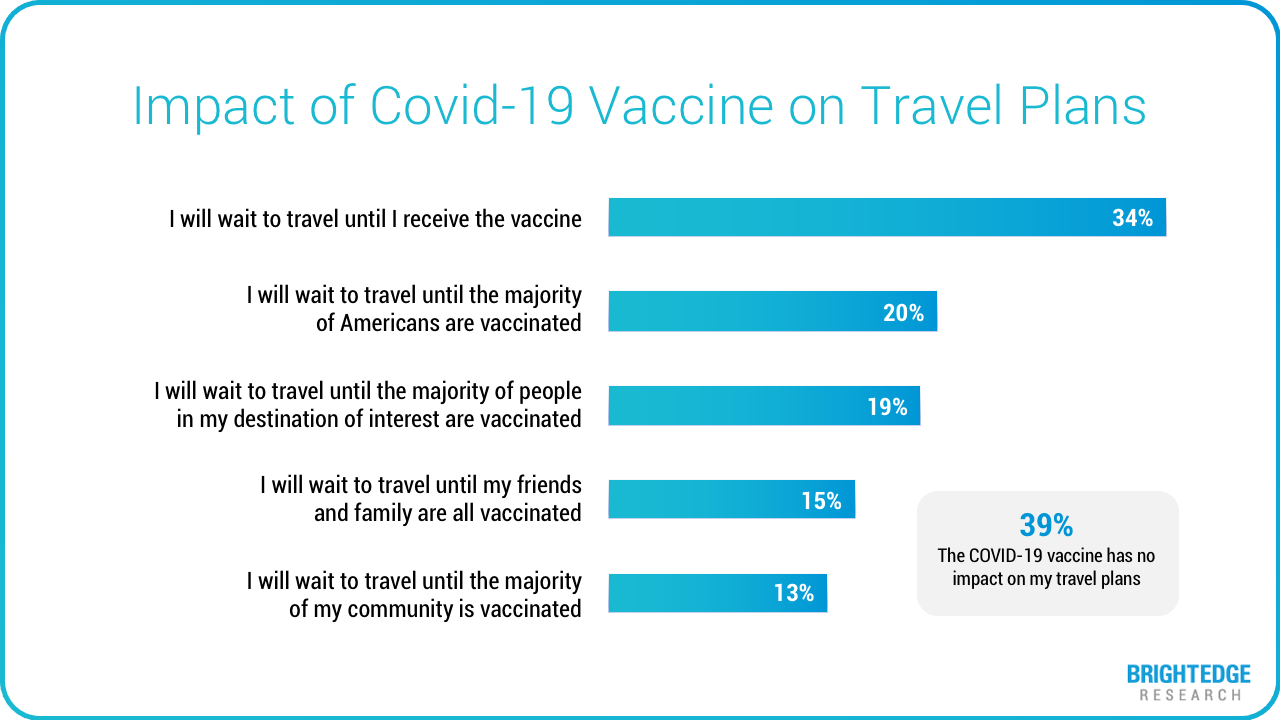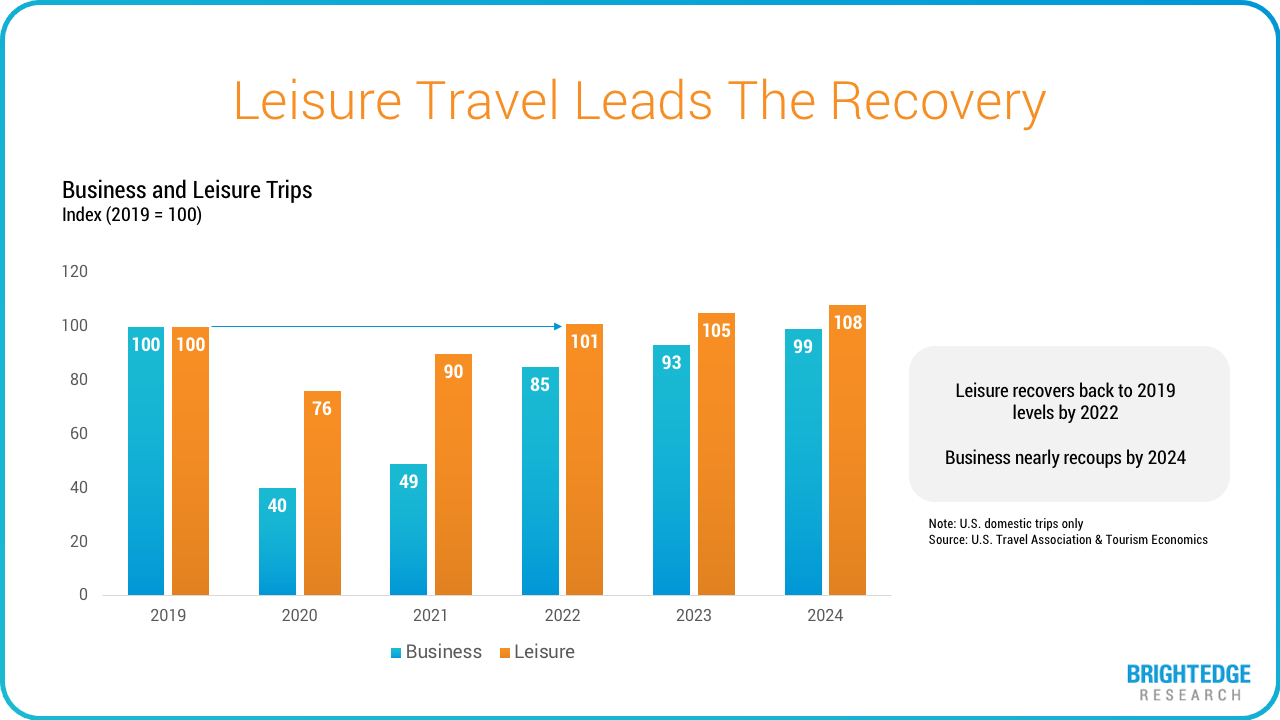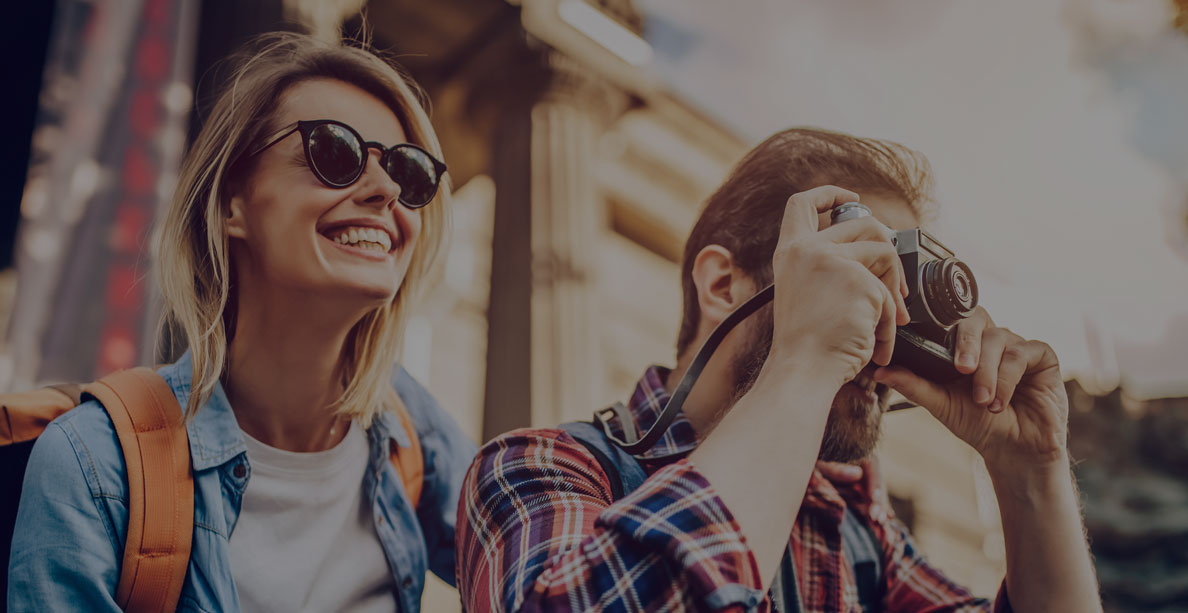While 2020 brought travel to a near standstill, 2021 has shown signs that travel is picking up. Though, how long before we expect it to return to its once booming state? Research says not for a few years. What does SEO and keyword research tell us about these trends? Let’s look! Dive into the digital growth and future of travel and hospitality with us.
What is Impacting Travel and Hospitality Industries?
As of April 11, 2021, 21.9% of the eligible US population has been vaccinated for COVID-19 and as a result, the travel and hospitality industry continue to be down from its pre-pandemic trend. While Americans await their first and second doses, immediate travel and future bookings are expected to pick up over the next few months but according to Statista, it could take years for the aviation industry to make a full recovery due to limited capacity on flights. There are still many airlines taking safety measures like seat blocking and reducing flight availability.
More Americans are booking travel for future months as flight prices are currently on the low end and airlines are allowing more flexibility on flight changes and cancellations. Bookings for Q3 and Q4 are already coming in, but it’s projected that travel will hit a record high in 2022.
Watch our April webinar on How Vaccines Will Shape the Future of SEO and Digital

The Future of Travel and Hospitality in 2021
As vaccines become more widely available, more people are expected to travel in 2021 than in both 2020 and 2019. Because 2020 was a year of sadness and uncertainty, more Americans are looking to travel to feel some sense of normalcy. More than 1.57 million people went through TSA checkpoints on March 28, 2021.
But not only are people looking to travel, they’re looking to travel in big ways. Forbes expects people to travel to more isolated areas and encourages travel to places like Kenya, Costa Rica, New Zealand, Slovenia and more.
Countries including Estonia and Bermuda are opening their doors to remote workers for the entire 2021 year with temporary visas for up to one year to get tourists there in hopes of growing their economies again.
Digital Marketing Tips to Win Bookings
As our ability to travel continues to increase, it’s important that companies in the travel and hospitality industry promote great website user experiences in order to maximize transactions. As remote work became more common, and people across the country are spending more time at home, the importance of your digital footprint and brand became more paramount than ever before.
If you are in the travel or hospitality industry, you’ll want to create content around travel, optimize your pages for quick loading times and relevant keywords, and maintain an easy-to navigate, and responsive site that supports users throughout their research and transaction. By starting with keyword research, you can identify the most searched keywords your audiences using. You can leverage Instant to deep dive the places consumers are looking to go.
As travel bookings increase, it’s important to maintain a digital strategy for every step in the buyer journey. Below are a few ways to attract consumers to your site.
- Create a subscription-based newsletter that offers travel and booking insights as well as promotional offerings. Here, you’ll receive user information to target them with more helpful resources and information at a later date.
- Develop an engaging and gratifying social media experience for users to drive excitement around traveling with or to your brand.
- Make booking on your site as easy as possible. Travelers will be seeking quick and easy booking options and you’ll need to maintain speed and smart transaction flows in order to keep their attention.
- Leverage influencers or travel bloggers/vloggers to help promote their experiences traveling with you.
- Create a data-drivent content calendar based on the destinations and experiences travelers can expect or access when booking with you, such as nightlife, beaches, parks, food, and drinks.

Schema for Travel and Hotel SEO
Schema is structured data markup that provides search engines with information about content by defining what it is. You can use schema markup to be better understood by search engines like Google, Bing, Yahoo and Yandex – the original developers of schema markup.
There are hundreds of schema entity types, so before you begin using schema, you’ll want to determine which entity types you should be using. You can find a full list of schema types at schema.org.
The most important schema entity types for travel and hospitality include the following.
- Schema for a trip. You’ll use trip schema markup to indicate a full trip, part of a trip, sub trip and more.
- Schema for a flight. With an increase in flight bookings this year and the competitiveness of Google Flights, you’ll use schema for flights to tell search engines you also offer flight booking opportunities.
- Schema for a tourist attraction. Here, you’ll use tourist attraction schema for places in a specific geographical area that are typically seen as tourist destinations.
- Schema for a hotel room. You’ll leverage hotel schema to tell search engines the bed types you offer, occupancy , floor plans, property types and more.
- Schema for a suite room. Use suite markup to denote to search engines the luxuries you offer in your suites.
As travel and tourism begins to rebound and trends back to the once thriving industry, we remember pre-COVID, we hope you’ll use these tips to improve your digital marketing strategy and SEO plan for your travel or hospitality brand. We invite you to take next steps and learn how Market Insights can help you understand search and market trends related to your specific audience in order to create the best content strategy, gain a leg up on your competition, and increase travel bookings through your site.

